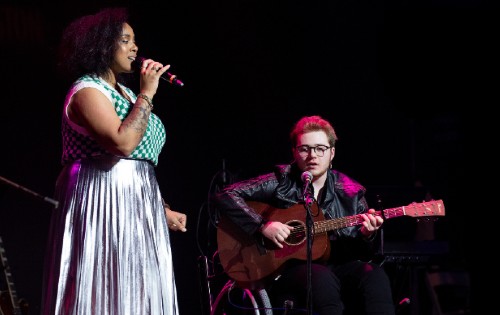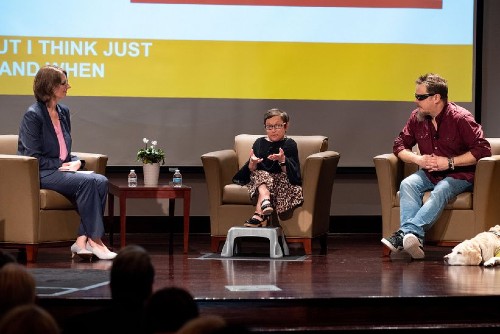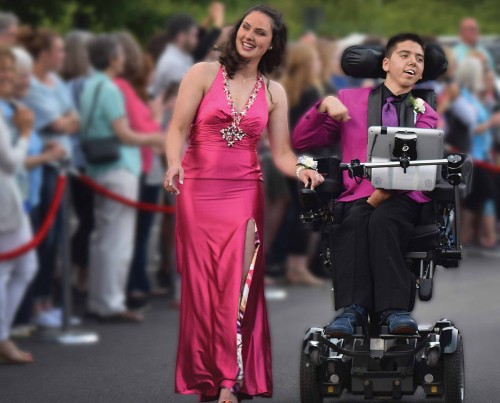
Since 2013, the first year of the festival in Houston, TIRR Memorial Hermann has served as the founding and lead sponsor of the event, in keeping with the health system’s emphasis on and advocacy for “full inclusion for people with disabilities,” according to Jamie Paul Weiner, the Alexander Jewish Family Service’s (JFS) manager for disability services and an officer of the Houston JFS Alexander Institute for Inclusion. JFS, founded in 1913, is a Houston-area human service organization dedicated to transforming the lives of individuals, families and communities with services ranging from job placement to counseling and disaster response, and produces the event in conjunction with the Mayor’s Office for People with Disabilities.
“At its heart, the ReelAbilities Film Festival uses the arts to reveal the journeys of people with disabilities,” Weiner notes. “Our goal is to change hearts and minds through the arts, to really encourage people to rethink how they view people with disabilities, in the workplace and in the community. We strongly believe the arts are one of the most powerful ways to do that.”
Although there are ReelAbilities festivals in several cities across the United States, the Houston festival, along with New York City, is among the largest—reflecting the city’s leadership role in improving the lives of people with disabilities, she adds.

“TIRR Memorial Hermann has been key to that as well,” Weiner says. “When we started the festival here, we dreamed large and had big goals; and TIRR Memorial Hermann, with its focus on full inclusion for people with disabilities in the community, kept challenging us to add more innovative elements to it. From the beginning, they truly understood how this citywide effort could reach people in new and different ways.”
“The festival is so meaningful to me personally, because it’s something my family and I look forward to attending every year,” adds Rhonda M. Abbott, PT, FACHE, the senior vice president and CEO at TIRR Memorial Hermann. “It really shows that the care offered at places like TIRR Memorial Hermann is so much larger than health care within the four walls of the hospital. It’s about service to the world.”
The Festival
Thanks to this bold vision, the ReelAbilities Film Festival in Houston now goes beyond its original mission of showcasing movies made by and/or about people with disabilities to include music, art and educational programs.
The three-week event, scheduled for Feb. 4-28, 2024, kicks off with ReelArt, an exhibition of the work of artists affiliated with the Joan and Stanford Alexander Celebration Company, which is a program to provide supportive and transitional employment and life skills for adults with disabilities. The exhibition will be held at Houston’s Sawyer Yards and feature 30 artists. There is always a guest artist, and some have been former patients at TIRR Memorial Hermann.

The festival continues with the ReelPeople: UP Abilities speakers’ program, an evening of talks delivered by world-class authors, activists and athletes. The 2024 program will feature chef Eduardo Garcia, athlete and activist Daniel Barvin and activist Gabriel Cordell. This dynamic program will be held at the United Way headquarters.
That’s followed by the ReelAbilities Film Festival, held at the Regal Edwards Greenway Grand Palace theater in Houston. The program showcases films made by and/or about people living with physical and mental disabilities, with a different movie featured each night.
ReelAbilities Houston’s film week concludes with ReelMusic at White Oak Music Hall, which features performances by musicians with disabilities. The idea isn’t just to highlight their talents, but to help launch their careers as professional musicians, notes Carl Josehart, MSW, the CEO of Alexander JFS.
“ReelMusic started as a way for musicians with disabilities to build their resumés,” he explains. “We have found that the more these talented musicians are out there playing, the more opportunities they have. However, these performances also really open doors for the next generation of musicians with disabilities because they break down barriers.”
One former TIRR Memorial Hermann patient who has been featured in the ReelMusic program is Brandon Ray, who initially lost his ability to walk, speak and, most importantly, sing after a series of strokes in 2017. The long-time, semi-professional singer eventually regained his voice and his ability to play guitar with the help of specialists at TIRR Memorial Hermann, and became a ReelMusic favorite.
Although the ReelArt Crawl on February 25th marks the festival’s conclusion, another program, ReelEducation, continues throughout the festival and beyond, bringing speakers and exhibitions to more than 5,000 students, from grade school through college, in the Houston area. Past speakers include Enrique Oliu, a broadcaster for Major League Baseball’s Tampa Bay Rays who is blind and has also been the subject of a documentary titled “Henry O!,” shown at a past ReelAbilities Film Festival. He will be in Houston again in 2024 for ReelEducation presentations.
Another ongoing program emanating from the festival is ReelWorkplace, which engages business leaders from “companies that have made a commitment to recruiting and hiring people with disabilities,” according to Weiner. This year, ReelWorkplace will take place on February 28th and will feature four professionals whose experiences of accomplishment will put the spotlight on how businesses can partner with their employees for mutual success.
“We have seen that the festival has helped us create new collaborations with business and organizations that yield an impact that lasts way beyond the festival,” she says.
All About Accessibility
The primary driver of the success of the ReelAbilities Film Festival in Houston has been the “three-way partnership between Alexander JFS (specifically the Alexander Institute for Inclusion), TIRR Memorial Hermann and the city itself, the latter through the Mayor’s Office for People with Disabilities, Weiner says.
“Houston is a leading city in disability advocacy in the country, and in the world—as well we should be given the diversity of our population” she adds.
That tradition stems from the work of community leaders such as disability rights activist and former TIRR Memorial Hermann executive Lex Frieden, who is credited with pushing for the creation and passage of the Americans with Disabilities Act. Frieden continues to be a driving force behind Houston’s efforts to improve accessibility in public spaces, including mass transit and city parks.

“I’ve been a part of the festival for about seven years, and the respective missions of the event and the health system really align with each other,” explains Christine Adair, MOT, OT, FACHE, the vice president of operations at TIRR Memorial Hermann. “Through the ReelAbilities Film Festival, people can share their stories in a way that educates others, changes perceptions and celebrates inclusion, while also showcasing talent and artistry. By the nature of how it functions, the festival also brings people together through commonalities, and it creates a fun place for people while providing a sense of inspiration and hope for people who are new to the disability community. The event teaches them they can get up on stage or get behind a camera and produce a film and that they can create art. It may be in a different way than before, but it’s still beautiful.”
This message is particularly important for Adair, whose work as an occupational therapist focuses primarily on helping patients with disabilities resume normal activities of daily living following hospital discharge. She sees training in the arts, for those who wish to pursue it, as an “integral part of holistic care” for patients, and ReelAbilities provides a venue for showcasing the fruits of these efforts.
“There is a real focus on advocacy and community reintegration,” Adair says. “The more we can create partnerships with members in the community to help patients leave our walls to become productive, happy, healthy members of the community, the more it helps everyone—the patients, their families and society as a whole.”
“Before coming to TIRR Memorial Hermann, many of these patients had the experience of physicians telling them, ‘You can’t; you won’t,’” Josehart adds. “At TIRR Memorial Hermann, health care professionals are focused on possibilities, and this festival champions not only the successes of artists but of real people in real life.”
Perhaps not surprisingly, given this history and focus, Houston has embraced the ReelAbilities Film Festival. After all, one in four people in the United States will have a disability in their lifetime, so the issue touches the lives of most Americans, and Houstonians are no different, according to Abbott, TIRR Memorial Hermann’s senior vice president and CEO.
Mayor Sylvester Turner and members of the City Council not only have attended the festival but create public service announcements for radio and television in support of the event and spread the message through social media. As a result, more than 8,000 people are expected to attend the 2024 festival.
Once at the various venues, those attendees will benefit from the “most accessible arts festival in the country,” both in terms of its infrastructure (seating, ramps, etc.) as well as use of technology to enable everyone to enjoy the programming, including customized audio descriptive recordings of the featured films for visually impaired individuals, according to Weiner.

In addition to TIRR Memorial Hermann, 40 local sponsors help ensure that the art, film and music events that are part of the festival are free to the public, she says.
Part of that service is the continued growth of an impressive citywide cultural event that reaches thousands of people and leads them to become advocates for inclusion. The impact of this effort lasts well beyond the festival, and initiates conversations and collaborations that will make a real difference in Houston and across the country, Weiner explains. TIRR Memorial Hermann has been instrumental in this success.
“Over the 10 years of the festival, we have seen it create continuous attention to this subject and a conversation year-round,” she says. “The festival is a huge celebration of possibility, but also a realistic lens into the lives of people with disabilities, and that can only help as we strive to create more welcoming, inclusive and accessible communities.”
To learn more about the festival, to arrange a screening at your business or school or to register for an event, please visit ReelAbilitiesHouston.org.
